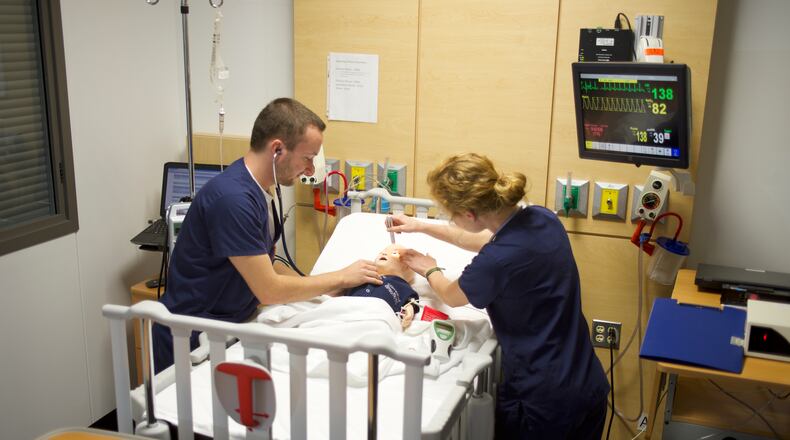“With a nursing shortage going on, which was increased by COVID ... we wanted to make as many tracks available with our bachelors degree,” said Paula Reams, Kettering College dean of nursing.
These announcements in recent weeks aren’t the only examples of schools betting on nursing. Wright State University’s nursing program has also grown in recent years, with increased enrollment and more space at the Lake Campus.
There are several factors driving the growth in different types of nursing programs.
For Cedarville, the plan comes from the expected increase in professions required to have a doctorate of nursing practice.
Nurse practitioners, nurse anesthetists, and nurse midwives are expected to grow as a field by 45% through 2030, according to the Bureau of Labor Statistics.
And more of these advance practice nurses are expected to be required to get doctorate degrees in the future, according to Dr. Angie Mickle, dean of the school of nursing. Doctor of nursing practice degrees have grown in step with this, with program applications nationally up 39% between 2017 and 2020.
“Right now, if you want to become a nurse anesthetist you cannot do it with a master’s degree,” Mickle said.
Sinclair announced in January that it is increasing the annual capacity of its nursing associate of applied science program from 144 students to 162 beginning Spring Term 2022.
Dr. Rena Sebor, dean of the Sinclair College Health Sciences Division, said by increasing the number of students “Sinclair is playing an integral role in filling the growing need for skilled workers on the frontlines of the COVID-19 global pandemic.”
Kettering College, affiliated with Kettering Health, is starting a new full-time, 15-month track to get a bachelor’s of nursing program. The school is pitching the program, which begins fall 2022, toward people with a degree who want a career change.
While demand for nursing school is high, its a national challenge to recruit faculty for a new program launch, because nurses generally get paid more in a clinical setting than in academia.
U.S. nursing schools turned away 80,407 qualified applicants from baccalaureate and graduate nursing programs in 2019 due to insufficient number of faculty, clinical sites, classroom space, and clinical preceptors, as well as budget constraints, according to American Association of Colleges of Nursing.
“Overarching in our profession, the faculty shortage is a problem,” Mickle said.
Officials with the different colleges cited the nursing shortage as fueling their program growth. Even before the pandemic, the profession was documenting burnout, high numbers of RNs leaving the bedside for advanced degrees, and trouble keeping up with demand growth as health facilities expand.
The pandemic then spurred additional early retirements and resignations.
The accelerated BSN track is one of several nursing tracks at the college and part of a strategic plan to double the number of students in the school’s nursing program to about 250.
“The college has long been a pipeline for employment at Kettering Health,” said Jennifer Schull, executive vice president and chief nursing officer at Kettering Health. “We hire hundreds of nurses a year at our 13 hospitals and outpatient centers, and in 2021 more than half of them were new Kettering College nursing graduates.”
Some of the details of the different program plans include:
Sinclair Community College
Sinclair is increasing the annual capacity of its Nursing Associate of Applied Science Degree Program from 144 students to 162 (81 per semester) beginning Spring Term 2022.
Information about Sinclair’s nursing program is available at sinclair.edu/nursing.
Kettering College
Kettering College is starting a new accelerated Bachelor of Science in Nursing track beginning in fall 2022.
The full-time, 15-month track is being pitched for college graduates seeking a career change. Students are advised not to have a job outside of their schooling because it is an intensive track.
The college is expanding its faculty, staff, and classroom and study spaces to accommodate 32 A-BSN students per year.
Tuition will be the same as for other BSN tracks at Kettering College. More information, including about prerequisites, is at kc.edu/A-BSN.
Cedarville University
University leadership recommended, and the board approved, implementing a Doctor of Nursing Practice (D.N.P.) degree.
Cedarville currently prepares Family Nurse Practitioners and Pediatric Nurse Practitioners for licensure at the master’s level.
With board approval, the university now needs to seek the necessary external approvals for the new program in order to launch for fall 2023.
About the Author



